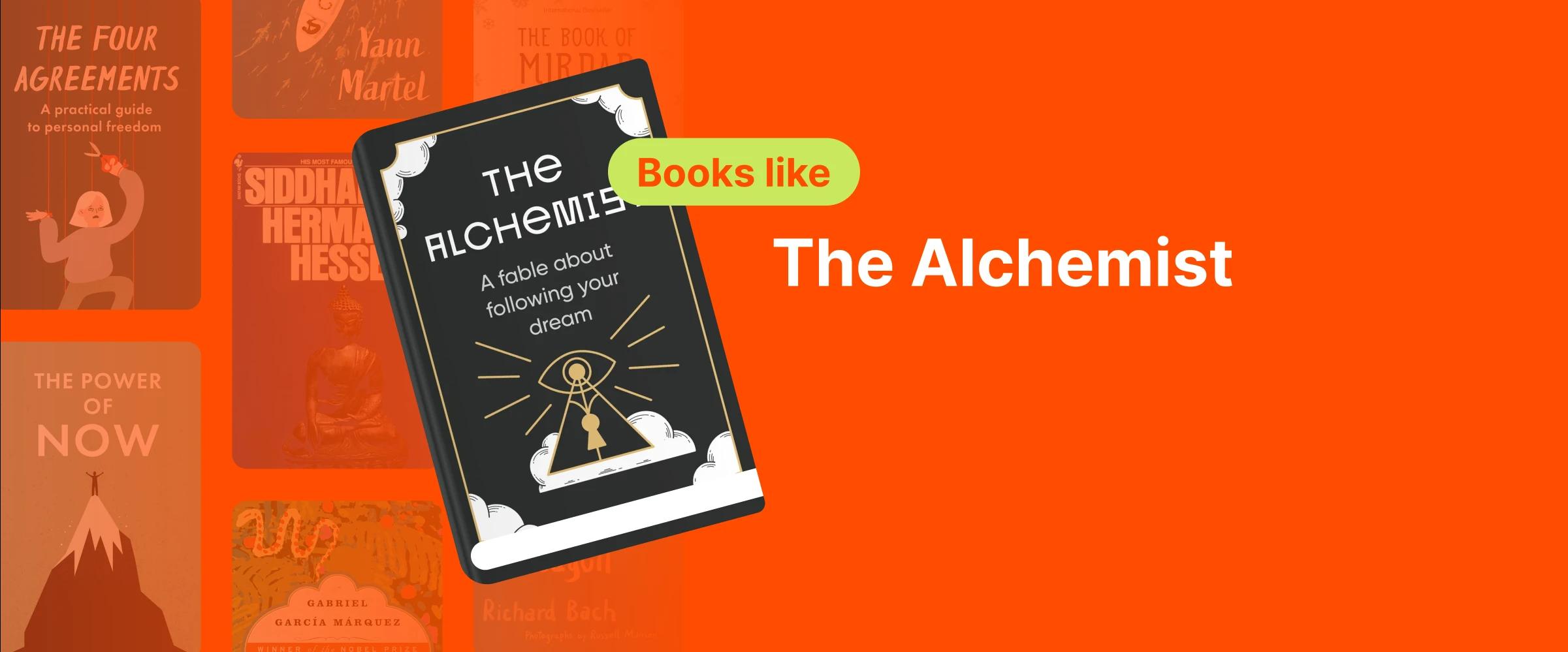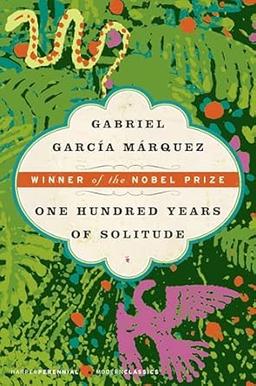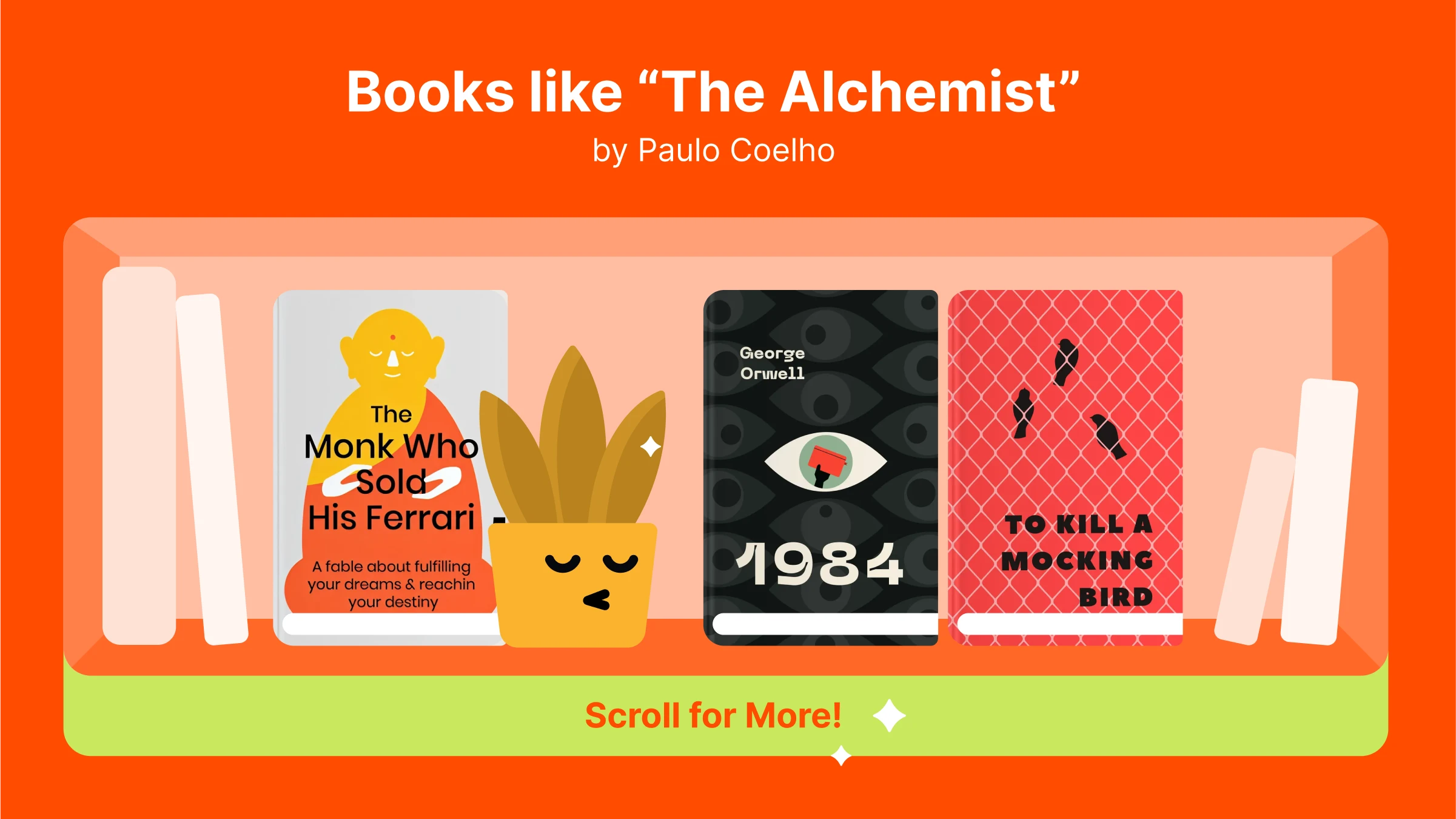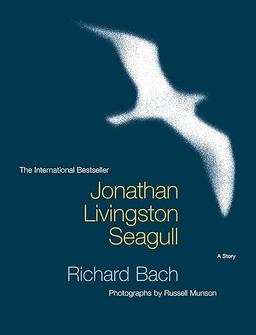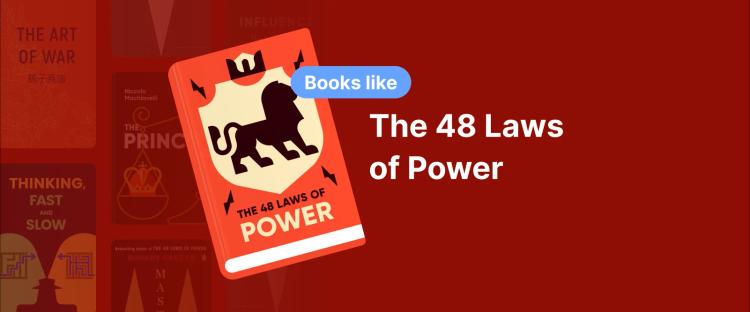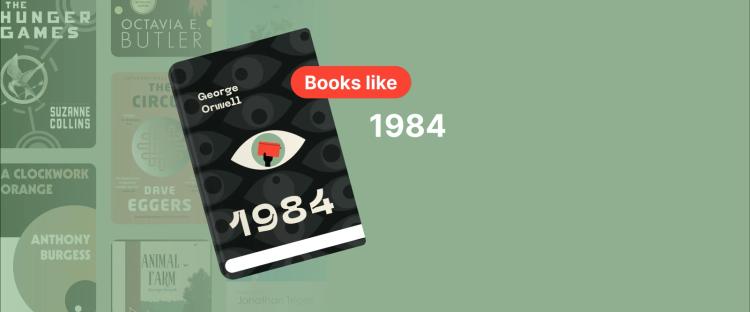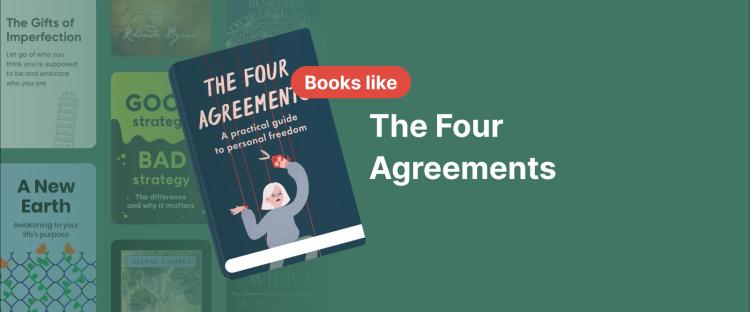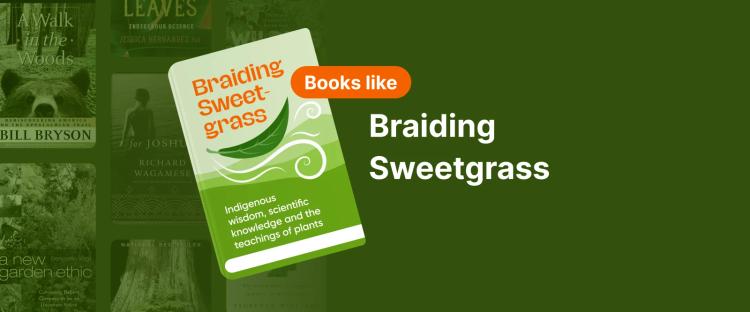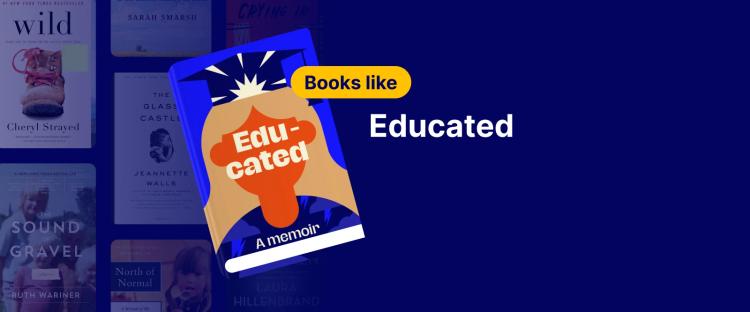Ever finished a life-changing book and felt lost without its wisdom to guide you? Paulo Coelho's 'The Alchemist' has captivated over 65 million readers worldwide, and literary experts like Harold Bloom and spiritual teachers such as Oprah Winfrey have praised its universal appeal.
If Santiago's journey resonated with you, books like 'The Alchemist' — including 'Siddhartha,' 'The Monk Who Sold His Ferrari,' and 'Jonathan Livingston Seagull' — offer similar transformative experiences, covering themes like destiny, love, and the pursuit of one's dreams.
Not sure which book to dive into next? Use Headway as your personal shortcut — explore nonfiction book summaries first, then decide what's worth the full read. With sleek design, quick formats, and progress tracking, it's like having a personal library in your pocket.
Download Headway and turn big ideas into daily habits!
Quick guide to books like 'The Alchemist':
'Siddhartha' by Hermann Hesse for Eastern spiritual enlightenment journeys
'The Monk Who Sold His Ferrari' by Robin Sharma blends success with inner peace
'Life of Pi' by Yann Martel explores survival and faith through symbolism
'Jonathan Livingston Seagull' by Richard Bach celebrates breaking free to reach your potential
'The Pilgrimage' by Paulo Coelho follows the author's own transformative quest
Keep reading for the full list of books!
16 best books similar to Paulo Coelho's 'The Alchemist'
If you've been moved by the journey of Santiago, the Andalusian shepherd boy in 'The Alchemist,' now considered by some a modern classic, you might be wondering, what other books can offer similar experiences?
There are other works by Paulo Coelho, as well as other authors, that echo the themes of personal growth, enlightenment, and self-discovery found in Paulo Coelho's globally acclaimed novel. These inspirational books invite readers to embark on their own quests for meaning, challenging and inspiring them.
📘 Craving more transformative reads like these? Try Headway for 15-minute insights from life-changing books!
1. 'The Monk Who Sold His Ferrari' by Robin Sharma
'The Monk Who Sold His Ferrari' by Robin Sharma is a fable that offers readers a step-by-step approach to living with greater courage, balance, abundance, and joy.
It tells the story of Julian Mantle, a high-powered legal barrister who has a spiritual awakening after suffering a heart attack, following which he discovers a powerful system to release the potential of his mind, body, and soul.
Similarities between the books:
Pursuit of true purpose; treasures found within.
Shedding old beliefs to embrace enlightened living.
Following dreams and listening to your heart.
2. '1984' by George Orwell
'1984' by George Orwell is a gripping dystopian novel that explores the horrors of totalitarianism and the struggles of individual freedom under an oppressive regime.
The story follows Winston Smith, a low-ranking member of the ruling Party in Oceania, who begins to question the Party’s tyrannical control and pervasive surveillance.
As he secretly rebels against Big Brother, Winston uncovers the depths of propaganda, manipulation, and cruelty that the government uses to maintain power, all while risking his life in the hope of freedom and truth.
Similarities between the books:
Transformative journeys challenging boundaries to pursue personal truths.
Self-discovery and pursuit of meaning as central themes.
Powerful symbolism enriching protagonists' struggles.
3. 'To Kill a Mockingbird' by Harper Lee
‘To Kill a Mockingbird’ by Harper Lee is a powerful exploration of justice, morality, and empathy set in the American South during the 1930s.
The story follows young Scout Finch, who, through her father Atticus's defense of a Black man wrongly accused of rape, learns valuable lessons about human nature, prejudice, and the importance of standing up for what is right.
Through her observations, Scout undergoes a journey of moral growth, learning to see the world through the eyes of others and developing a deep understanding of compassion.
Similarities between the books:
Journeys of self-discovery challenging societal expectations.
Morality and personal values drive character actions.
Rich symbolic context for protagonist growth.
4. 'The Four Agreements' by Don Miguel Ruiz
‘The Four Agreements’ by Don Miguel Ruiz is a guide to personal freedom and inner peace, drawing on ancient Toltec wisdom.
Through four simple yet profound agreements — be impeccable with your word, don’t take anything personally, don’t make assumptions, and always do your best — Ruiz offers a transformative approach to life.
This journey of self-awareness and discipline empowers readers to break free from limiting beliefs and cultivate genuine happiness and fulfillment.
Similarities between the books:
Breaking free from limitations to discover potential.
Profound wisdom conveyed simply.
Universal teachings providing timeless guidance.
5. 'The Power of Now' by Eckhart Tolle
‘The Power of Now’ by Eckhart Tolle is a transformative guide to achieving mindfulness and living fully in the present. Tolle encourages readers to detach from past regrets and future worries, focusing instead on the power of the current moment.
By practicing awareness and letting go of mental distractions, readers can find a deep sense of peace, clarity, and self-realization that transcends the daily grind.
Similarities between the books:
Living with purpose and authenticity.
Timeless spiritual lessons releasing limiting beliefs.
Universal messages about meaningful existence.
📘 Ready to transform "now" into your superpower? Try Headway for daily doses of mindfulness wisdom
6. 'Siddhartha' by Hermann Hesse
'Siddhartha' by Hermann Hesse is akin to 'The Alchemist' in its thematic focus on pursuing enlightenment and the protagonist's better understanding of himself and the world around him.
The narrative chronicles the quest of a young man from India named Siddhartha as he endeavors to attain wisdom and a deeper understanding of himself.
In parallel with Santiago's experiences in 'The Alchemist,' this Indian man meets an array of characters who each contribute different viewpoints that shape his growing comprehension of life's essence and his own identity.
Similarities between the books:
Quests for enlightenment and deeper world understanding.
Symbolic elements representing spiritual struggles.
Listening to one's heart despite societal pressures.
7. 'One Hundred Years of Solitude' by Gabriel Garcia Márquez
'One Hundred Years of Solitude' by Gabriel Garcia Márquez is a seminal work of magical realism that tells the multi-generational story of the Buendía family in the fictional town of Macondo.
The narrative weaves together the personal and the political, exploring the complexities of time, history, and memory through the lives of characters who experience love, loss, and the surreal.
Similarities between the books:
Destiny guided by larger, unseen forces.
Understanding personal history for life journey insights.
Events leading to greater self-awareness.
8. 'Life of Pi' by Yann Martel
'Life of Pi' by Yann Martel is about a boy named Pi and a Bengal tiger named Richard Parker trying to survive together on a lifeboat in the ocean.
The story shows how strong and hopeful people can be in tough times, as Pi confronts the vastness of the ocean and the challenges of survival with hope and ingenuity.
Similarities between the books:
Journey as profound teacher and source of self-discovery.
Life-threatening challenges testing faith and determination.
Relationship between human spirit and divine.
Ocean and desert as metaphors for inner journeys.
9. 'The Book of Mirdad' by Mikhail Naimy
'The Book of Mirdad' by Mikhail Naimy is a mystical story set within the walls of a remote monastery that serves as a lighthouse for the human spirit.
The protagonist, Mirdad, arrives at the monastery aboard Noah's Ark and becomes a teacher to the monks, imparting wisdom that transcends conventional religious doctrines.
He teaches about love, the futility of worldly possessions, and the quest for inner truth, challenging the monks to look beyond the illusions of the material world and discover the eternal and unchangeable reality that lies within.
Similarities between the books:
Inner wisdom and enlightenment over external guidance.
Spiritual journeys leading to profound self-discovery.
Allegory showing true treasure lies within.
10. 'Jonathan Livingston Seagull' by Richard Bach
'Jonathan Livingston Seagull,' a novel by Richard Bach, is an inspiring fable about a seagull named Jonathan who is not content with the mundane life of squabbling over food scraps. Determined to find more to life, Jonathan embarks on a journey to perfect the art of flight.
His quest for mastery takes him far beyond the confines of his flock and into a philosophical exploration of freedom and the desire to reach one's highest potential.
Similarities between the books:
Pursuing personal legends and full potential.
Parable imparting inspirational life lessons.
Breaking free from expectations to pursue true calling.
📘 Want to soar beyond the ordinary like Jonathan? Try Headway and discover summaries that help you fly toward your highest potential.
11. 'The Prophet' by Kahlil Gibran
'The Prophet' by Kahlil Gibran is a collection of poetic essays about the complexities of life and the human spirit.
The protagonist, Almustafa, is about to board a ship that will carry him home after twelve years of exile when he is stopped by a group of people who ask him to share his wisdom on various aspects of life.
Through his philosophical responses, Gibran explores profound themes such as love, work, joy and sorrow, freedom, and death, offering timeless insights into the human condition.
Similarities between the books:
Rich metaphor and allegory with philosophical insights.
Wisdom on life's great truths encouraging introspection.
Love, destiny, and personal legend as central themes.
Physical and spiritual journeys leading to transformation.
Inspiration to contemplate purpose and fulfillment.
12. 'The Pilgrimage' by Paulo Coelho
'The Pilgrimage' by Paulo Coelho is a mystical story of the author's pilgrimage along the Camino de Santiago to find spiritual enlightenment and self-transformation.
As Coelho travels this ancient route, he encounters a series of trials and spiritual exercises that lead him to question his beliefs.
The book combines adventure, philosophy, and introspection elements, much like a personal transformation diary.
Similarities between the books:
Personal quests and spiritual path pursuits.
Numerous challenges testing resolve and faith.
Understanding and interpreting signs and omens.
13. 'Ishmael' by Daniel Quinn
'Ishmael' by Daniel Quinn is a thought-provoking novel that takes the form of a Socratic dialogue between a man and a telepathic gorilla named Ishmael. As the two talk, the author invites the readers to reconsider humanity's role in the world and our relationship with nature.
Quinn's narrative explores the topics of freedom, captivity, and the search for meaning, as Ishmael guides his human pupil through a re-examination of Western society's historical narrative.
Similarities between the books:
Questioning traditions and societal norms.
Destiny and interconnectedness of all life.
Storytelling conveying deeper truths through parable.
14. 'Tuesdays with Morrie' by Mitch Albom
'Tuesdays with Morrie' by Mitch Albom is a poignant memoir that chronicles the time the author spent with his former sociology professor, Morrie Schwartz, during the final months of Morrie's life.
As Morrie faces the debilitating effects of ALS, their weekly meetings become a series of final lessons on how to live. The book is a touching narrative that encapsulates Morrie's wisdom and insights on life's most significant aspects, including love, work, and the inevitability of death.
Similarities between the books:
Embracing life's journey and its lessons.
Wisdom on appreciating life's simplicity and beauty.
Reflecting on personal values and legacy.
📘 Missing those life-changing conversations? Try Headway for wisdom from mentors and thinkers who'll make you rethink everything — no Tuesdays required!
15. 'Daughter of Fortune' by Isabel Allende
'Daughter of Fortune' by Isabel Allende is an enthralling tale of love, adventure, and self-discovery set during the California Gold Rush.
The story follows Eliza Sommers, a Chilean orphan raised by a Victorian spinster and her brother in Valparaíso, who embarks on a perilous journey to California in search of her lover.
Along the way, Eliza encounters a diverse cast of characters and undergoes a transformation, shedding her old identity and embracing a new, empowered self.
Similarities between the books:
Leaving familiar lives to pursue passions in foreign lands.
Love and personal legends as central driving forces.
Rich cultural and historical details as vivid backdrop.
16. 'The Kite Runner' by Khaled Hosseini
'The Kite Runner' by Khaled Hosseini, an Afghan-American author, is a riveting tale of friendship, betrayal, and redemption set against the backdrop of a changing Afghanistan.
It follows the story of Amir, a young boy from Kabul, whose closest friend is his father's young Hazara servant, Hassan.
As Amir grows into adulthood, he is haunted by a childhood act of cowardice and betrayal towards Hassan, which leads him on a journey of atonement that spans continents and decades.
Similarities between the books:
Journeys far from home confronting deepest fears.
Cultural nuances shaping perspectives and choices.
Fate and true self-exploration as prevalent themes.
Other books like 'The Alchemist' worth exploring
While these 16 books offer transformative experiences similar to Paulo Coelho's masterpiece, consider these additional titles based on reader recommendations:
'Animal Farm' by George Orwell
'The Little Prince' by Antoine de Saint-Exupéry
'The Celestine Prophecy' by James Redfield
'The Secret' by Rhonda Byrne
What is 'The Alchemist' about?
These great books, like 'The Alchemist,' are not just stories. They offer philosophical insights, encourage introspection, and provoke a reevaluation of one's beliefs and worldviews. They share common themes with Paulo Coelho's 'The Alchemist,' such as the importance of dreams, the pursuit of personal legends, and the exploration of the self.
They are journeys that transcend geographical boundaries, looking into the landscapes of the human heart and soul.
The main message of ‘The Alchemist’ is the importance of following one’s Personal Legend, believing in destiny, and realizing that the universe helps those who pursue their true path.
The story follows Santiago, believed to be about 16 to 18 years old, as he leaves behind his first love — the merchant’s daughter — and embarks on a journey of self-discovery.
📘 Ready to discover your own Personal Legend? Try Headway for insights from books that help you decode your destiny!
Continue your self-growth journey with Headway book summaries
The quest for self-discovery extends far beyond Coelho's bestseller. These books like 'The Alchemist' await to transport you on new levels of wisdom, each serving as a compass pointing toward deeper self-reflection, understanding, and personal growth.
Turn your reading into a smart, daily habit with Headway! Track your growth in a beautifully designed app where you get key insights from top nonfiction titles in under 15 minutes, in both audio and text formats. Join 50 million users who choose smarter reading with progress tracking recognized by the App Store.
Download Headway today to explore summaries of transformative books and accelerate your personal development journey. Every book is another step toward understanding yourself and your purpose!
Frequently asked questions about books like 'The Alchemist'
Why do people love 'The Alchemist' so much?
Readers love Paulo Coelho’s 'The Alchemist' because it blends simple storytelling with profound wisdom. Its universal themes of destiny, personal growth, and the search for purpose resonate across generations. Readers from New York to New Delhi often describe it as a self-help classic disguised as a fable.
Why should everyone read 'The Alchemist'?
'The Alchemist' inspires readers to follow their passions, trust their instincts, and embrace life's journey — even when uncertain. The story reminds us that change and growth are natural and necessary for achieving dreams, making it essential reading for anyone seeking purpose.
Should a 12-year-old read 'The Alchemist'?
Yes, 'The Alchemist' is a perfect introduction to philosophical themes for young readers. Its positive message about following one's dreams is accessible to teens and adults. However, parents should make a conscious decision based on their child's maturity level.
What is the most life-changing book?
While many books can be life-changing, Paulo Coelho’s 'The Alchemist' is often recommended. Other transformative titles include 'Siddhartha' by Hermann Hesse, which combines Eastern philosophy with a personal quest for wisdom much like Santiago’s journey.
Can I read 'The Alchemist' in a day?
Yes, you can read 'The Alchemist' in a day. It's a short novel of about 160-180 pages with simple, accessible language. Most readers finish it in 4-6 hours. However, many prefer reading it slowly to absorb its philosophical messages and reflect on its deeper meanings.

